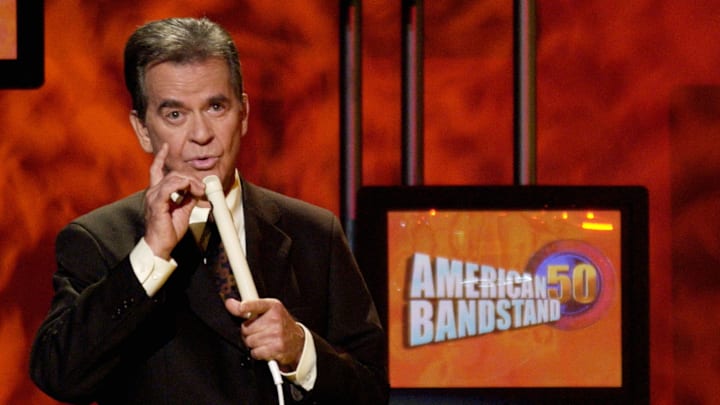American Bandstand was a long-running music/dance TV program that aired regularly from 1952 to 1989 and took on different forms as music trends changed. Dick Clark took over as host in 1956 until the final show. The series features teenagers who danced to the top 40 hits that Clark introduced and at least one live popular music act. American Bandstand set many music trends and helped push rock and roll into the foreground.
Clark was a well-known American TV and radio personality often referred to as “American’s Oldest Teenager,” as he never seemed to age. He is also remembered as the host of the game show Pyramid and Dick Clark’s New Year’s Rockin’ Eve, a New Year’s Eve celebration broadcast live from Times Square.
Dick Clark and American Bandstand were instrumental in bringing a more wholesome environment to bring rock and roll to the masses. Nothing changed with the style of music, but Clark’s rules of the audience dress code required the boys to wear jackets and ties and the girls in dresses or blouses and skirts. The dress code gave parents the impression that while the music was still rock and roll, the atmosphere was wholesome. Clark would also refer to the teens as ladies and gentlemen, which was just the way he was brought up.
Dick Clark and American Bandstand
During this time, parents were led to believe that rock and roll was vulgar and low-class music. Instead, it was just the next phase in the evolution of music. Many rock groups of the ‘60s would perform, and many acts received their first national exposure from performing on American Bandstand. A few of those featured are Ike and Tina Turner, Smokey Robinson and the Miracles, The Beach Boys, Stevie Wonder, Simon and Garfunkel, Jerry Lee Lewis, Buddy Holly, Johnny Cash, Sam Cooke, Fats Domino, and Chubby Checker.
Another great thing that Clark did after taking over as host of American Bandstand was to integrate the audience. They invited some black teens to the show and waited for repercussions; remember, the year was 1957, but there were none. This would lead to many black musical talents being introduced to white America. Clark didn’t do these things to spark a civil rights movement; he just believed it was the right thing to do.
Stairway to 11 is dedicated to providing news, reviews, and original content covering classic rock, oldies, and old-school music of all genres. This site also serves as a community for like-minded fans to catch up on the latest news and discuss their passion. Be sure to follow us on Facebook and Twitter.
